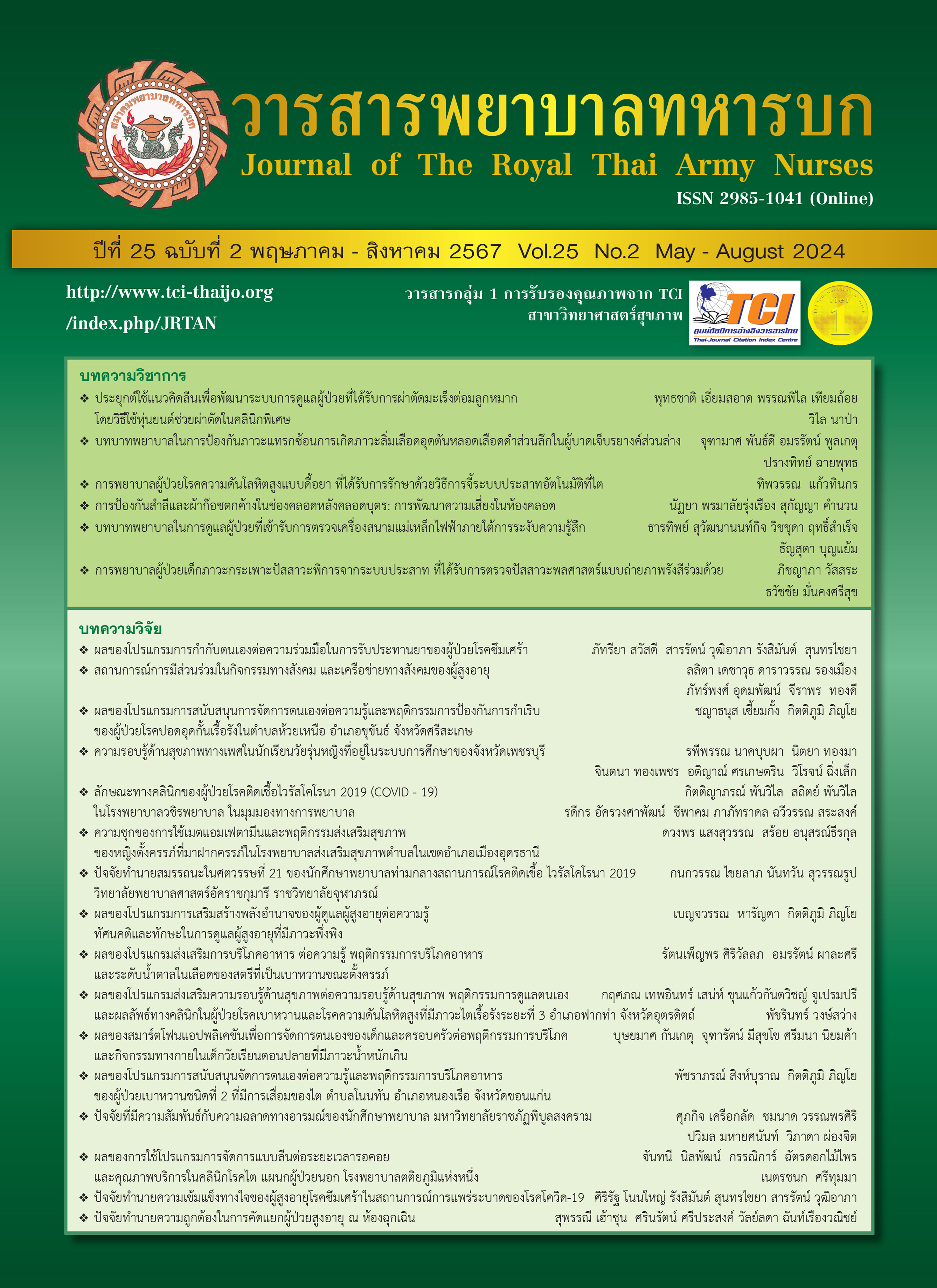Factors Predicting the 21st Century Competencies of Nursing Students during COVID-19 Situation Princess Agrarajakumari College of Nursing Chulabhorn
Keywords:
The 21st century Competencies, Nursing students, The COVID-19Abstract
This research aimed to study the 21st century competencies and their predictive factors among nursing students. The participants comprised 171 nursing students in the faculty of nursing, Princess Agrarajakumari College of Nursing Chulabhorn. The sample was selected by determining the proportion of students. Passed the quality test of research tools which include Personal information, Factors supporting online learning, Extra-curricular experiences, Perception of self-efficacy and Competency measures needed in the 21st century. Using Descriptive statistics, Pearson’s correlation coefficient and stepwise multiple regressions were employed for data analysis.
The results revealed that the 21st century competencies during the COVID-19 situation. showed the high scores (mean = 4.22, SD = 0.41). There were 3 influencing factors on the 21st century competencies during the COVID-19 situation. Including Self-Efficacy (β = .520), Factors supporting online learning (β = .230) and Extracurricular activity. (β = .197) Stepwise multiple regression analysis revealed that those aforementioned factors could explain 60.9 % of the variance in competencies during the COVID-19 situation. (F = 86.705; p-value <.001)
Downloads
References
Office of the Education Council, Ministry of Education. Study of learning regression basic education items in the COVID-19 situation: Situations, lessons, and guidelines for developing the quality of learning. Bangkok: Office of the education council; 2022. (in Thai)
Haslam MB. What might COVID-19 have taught us about the delivery of nurse education, in a post-COVID-19 world? Nurse Education Today. 2021; 97: 104707. doi: 10.1016/j.nedt. 2020. 104707.
Songthai N, Yottavee W & Seangkhiew P. Factors Influencing the online learning behaviors of Nursing Students: The lower northern region. Boromarajonani college of nursing, Uttaradit Journal. 2021; 13(1): 198-209. (in Thai)
Office of the basic education commission, (Draft) 6 core competencies: Competency-based education. Documents for the workshop on analysis, review, and improvement (draft) of the curriculum framework basic education. Ministry of Education. 2022. (in Thai)
Panlert C. Competency-based curriculum with the development of student quality. Academic journal. 2022; 22(1): 22-30. (in Thai)
Kang K, Lee M & Cho H. Interpersonal skills mediate the relationship between communicative and clinical competencies among nursing students: A descriptive study. Nurse Education Today. 2021; 99: 10479. doi: 10.1016/j. nedt.2021.104793.
Coombs NM. Educational scaffolding: Back to basics for nursing education in the 21st century. Nurse Education Today. 2018; 68: 198-200. doi: 10.1016/j.nedt.2018.06.007.
Thailand Nursing and Midwifery Council. Announcement of the Thailand Nursing and Midwifery Council on the main competencies of graduates of bachelor’s, master’s, and doctoral degrees in nursing science. Bangkok, Thailand: Legal department; 2018. (in Thai)
Tienkhaw S. Extracurricular activities for developing learners’ quality. Journal of Suvarnabhumi Institute of Technology. 2020; 6(2): 255-63. (in Thai)
Kim J. The empirical study of extracurricular activity on socially responsible leadership. Journal of leadership education. 2022; 1-14. doi: 10.12806/V21/I1/R6.
Alnaeem L. Involvement in extracurricular activities and overcoming high levels of communication apprehension among Saudi EFL majors. Arab World English Journal. 2021; 12(2): 185-208.
Kostovich CT, Van Denack J & Bachmeier P. “I will be here for you:” Nursing students’ perceptions of being present for their patients. In: 44th Biennial convention of sigma theta tau international. Sigma Theta Tau International, Indianapolis, Indiana; 2017.
Phipatanapanit P & Junsawang C. The comparative study on the nursing student’s perceived usefulness and satisfaction on different learning style in pathophysiology in nursing course. Journal of The Royal Thai Army Nurses. 2021; 22(3): 228-36. (in Thai)
Lanwong T, Phakdeechanuan K, Boonyoung. & Chukumnerd P. The influence of attitude knowledge self-efficacy and outcomes expectation to integration of eastern wisdom in nursing practice of nursing students. Faculty of Nursing, Prince of Songkla University. Songklanagarind Journal of Nursing. 2021; 41(2): 77-88. (in Thai)
Bandura A. Self-Efficacy: The exercise of control. New York: W.H.; Freeman and Company: 1997.
Office of the basic education commission, Ministry of Education. A guide to using measurement and evaluation tools to develop student learning and competency. Bangkok: Akson Thai Printing Ltd; 2022. (in Thai)
Chantra R. & Sarakshetrin A. Learning skills in 21st century of nursing students at Boromarajonani college of nursing, Suratthani. The Southern College Network Journal of Nursing and Public Health. 2020; 4(1): 180-90. (in Thai)
National association of school nurses. Framework for 21st-century school nursing practice TM: clarifications and updated definitions. National Association of School Nurse S Nurse. 2020; 35(4): 225-33. doi: 10.1177/1942602X20928372.
Spady WG. Outcome-based education: Critical issues and answers. Arlington. VA: American Association of School Administrators; 1994. ERIC: ED380910.
Tan K, Chong MC, Subramaniam P & Wong LP. The effectiveness of outcome-based education on the competencies of nursing students: A systematic review. Nurse Education Today, 2018; 64: 180-9. doi: 10.1016/j.nedt.2017.12.030.
Brennan BA. The impact of self-efficacy based prebriefing on nursing student clinical competency and self-efficacy in simulation: An experimental study. Nurse Education Today. 2022; 109: 105260. doi: 10.1016/j.nedt.2021.105260.
Pelikan ER, Luftenegger M & Holzer J et al. Learning during COVID-19: the role of self-regulated learning, motivation, and procrastination for perceived competence. Z Erziehungswiss. 2021; 24: 393–418. doi: org/10.1007/s11618-021-01002-x.
Kim BJ. & Chung JB. Is safety education in the E-learning environment effective? Factors affecting the learning outcomes of online laboratory safety education. Safety Science. 2023; 168:106306. doi: 10.1016/j.ssci.2023.106306.
Liu M, Zuo J, Tao Y, Zhao L, Wu S, Feng L & Liao L. Influencing factors of learning sustained attention for nursing students in online settings: A structural equation model. Nurse Education Today. 2022; 111: 105248. doi: 10.1016/j.nedt.2021.105248.
Downloads
Published
How to Cite
Issue
Section
License
Copyright (c) 2024 Journal of The Royal Thai Army Nurses

This work is licensed under a Creative Commons Attribution-NonCommercial-NoDerivatives 4.0 International License.
บทความหรือข้อคิดเห็นใดใดที่ปรากฏในวารสารพยาบาลทหารบกเป็นวรรณกรรมของผู้เขียน ซึ่งบรรณาธิการหรือสมาคมพยาบาลทหารบก ไม่จำเป็นต้องเห็นด้วย
บทความที่ได้รับการตีพิมพ์เป็นลิขสิทธิ์ของวารสารพยาบาลทหารบก
The ideas and opinions expressed in the Journal of The Royal Thai Army Nurses are those of the authors and not necessarily those
of the editor or Royal Thai Army Nurses Association.






